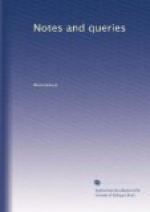However, if he wrote the passage when he was thirty, that would justify the past tense, which perhaps, too, we have a right to construe have been, for that verb has no perfect preterite.
C.B.
Lucy and Colin (Vol. iii., p. 7.).—The ballad adverted to, which is the one translated by Vincent Bourne, is by Tickel, and will be found in any collection of his works. Notwithstanding Southeys epithet “wretched!” it will always be admired, both in the original and the translation.
JAMES CROSSLEY.
Manchester, Jan. 18. 1851.
Translations of Apuleius, &c. (Vol. ii., p. 464.).—In answer to your correspondent, G.P.I., concerning a translation of the Golden Ass of Apuleius, I beg you will insert the following particulars.
There is a copy in the British Museum (Press Mark, case 21. b.) of a translation by Adlington. The title is as follows—"The XI. Bookes of the Golden Asse, conteining the Metamorphosie of Lucius Apuleius, enterlaced with an excellent Narration of the Marriage of Cupido and Psiches, set out in the iiii. v. and vi. Bookes. Translated out of Latine into Englishe by William Adlington. Imprinted at London, in Fleet streate, and the sign of the Oliphante, by Henry Wykes. Anno 1566." This work is of extreme rarity. At the end of the Dedicatory Epistle there is a MS. note, which I transcribe:—“This translation and its author has escaped ye notice of the Industrious Oxford Antiquary[14], for I find not his name in the Athen. Oxon., nor is the book menconed (mentioned)_ in Mr. Ames’s Typographical Antiquities, both which omissions add a singular rareness to this scarce book. R.E.W."_ The pagination of the book is only on one side, and contains 127 folios, including the table of contents. Ritson (vide note on fly-leaf) does not notice this edition (1566), nor the second in 1571, but quotes that of 1596.
KENNETH MACKENZIE.
[Footnote 11: Wood.]
Taylor’s translation of Apuleius’s Golden Ass, Lond. 1822, 2 vols., is said by Lowndes to be an esteemed version.
The French translations of the same work, according to De Bure (see Manuel du Libraire) are very inferior.
C.I.R.
Etymology of “Grasson" (Vol. iii., p. 8.).—Grasson appears to be derived front “grassor,” “to assail.” Livy somewhere has the following—“Grassor in possessionem agri”—which would be rendered, “To enter upon it by force;” it being only by the payment of the fine (Grasson) that the entry, “Grassor,” or alienation of copyhold lands, could be warded off: hence the act of the lord of the manor (Grassor) became the name for the fine paid by this tenant, “Grasson.”
BLOWER.
Lynch Law (Vol. iii., p. 24.).—Webster’s {77} American Dictionary (1848) explains this phrase thus—
“The practice of punishing men for crimes and offences by private unauthorized persons, without a legal trial. The term is said to be derived from a Virginian farmer, named Lynch, who thus took the law into his own hands.” (U.S.)
Webster is considered the highest authority in America, or I should not offer the above.




